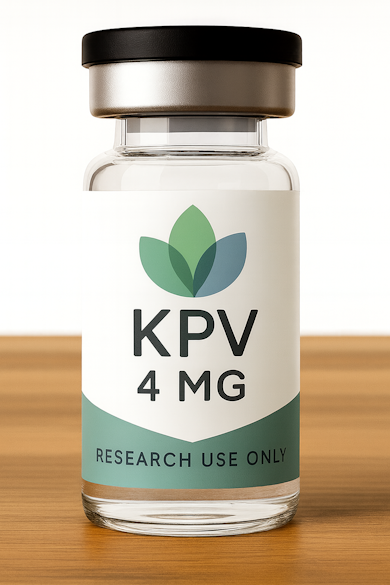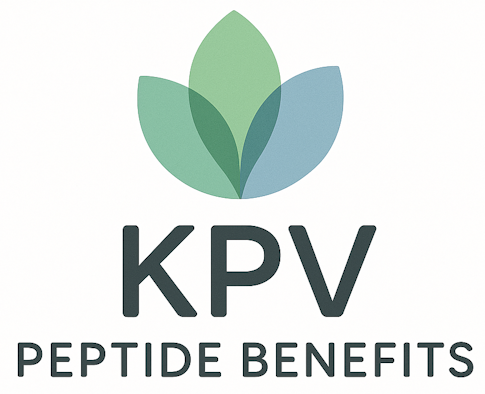KPV is a research peptide derived from the parent molecule alpha melanocyte stimulating hormone (α-MSH), specifically, the tripeptide sequence lysine proline valine. As part of ongoing peptide therapy research, this synthetic tripeptide has gained attention for its anti-inflammatory properties, potential to support wound healing, and improve gut health. Although no serious KPV peptide side effects have been observed in laboratory settings, researchers continue to evaluate its long-term effects and possible sensitivities.
For a deeper understanding of how this peptide works, see our detailed overview on KPV peptide mechanism of action and clinical research.
How KPV Works in the Body

KPV peptide functions as a shortened fragment of melanocyte stimulating hormone α. This sequence retains the parent molecule’s anti-inflammatory activity without its hormonal effects. In studies involving human bronchial epithelial cells and intestinal tissue, KPV has shown an ability to reduce pro-inflammatory cytokines and balance immune responses, which is particularly beneficial in treating various skin conditions. It acts as a selective modulator of the body’s immune regulation process, helping to restore tissue homeostasis in conditions marked by excessive inflammation.
The peptide works through stimulating hormone α MSH pathways, helping reduce systemic inflammation and promoting epithelial repair. These effects contribute to improved gut health, skin resilience, and faster wound healing by calming inflammation.
For guidance on laboratory use amounts and delivery methods, refer to our KPV Peptide Dosage guide.
Potential Side Effects and Observations
Research on KPV peptide therapy indicates a high safety margin. However, as with most peptide therapy compounds, mild and temporary effects can occur in certain cases, especially when influenced by systemic inflammation cues. Because KPV is a research peptide intended for laboratory research use only, side effects are studied mainly through cell cultures, animal studies, and experimental testing.
1. Immune Sensitivity
Some subjects with mast cell activation syndrome or histamine intolerance may show heightened sensitivity when KPV administered. These reactions often resolve as immune balance stabilizes. Researchers believe this may be due to temporary shifts in cytokine patterns and mast cell activity, particularly in conditions like ulcerative colitis.
2. Topical Irritation
When used in topical therapy formulations to study inflammatory skin disorders, KPV occasionally causes mild redness or dryness at the site of application. These effects are short-lived and consistent with other anti-inflammatory peptides used in dermatological models.
3. Gastrointestinal Sensitivity
In models of inflammatory bowel disease, including Crohn’s disease and ulcerative colitis, KPV has demonstrated remarkable ability to reduce intestinal inflammation and promote mucosal healing. However, mild gastrointestinal sensations such as bloating or sensitivity have been reported in some oral or subcutaneous injection studies.
4. Unknown Long-Term Outcomes
Since pharmaceutical grade KPV remains under preclinical investigation, the long-term effects of repeated administration are unknown. Ongoing studies aim to evaluate whether KPV influences chronic inflammation, immune suppression, or autoimmune disease risk in aging tissues.
Gut Health and Systemic Inflammation
The most significant area of KPV’s research involves its impact on gut health and systemic inflammation. Studies on the gastrointestinal tract demonstrate that KPV reduces inflammation and oxidative stress, improving intestinal barrier integrity. It appears particularly beneficial in conditions such as inflammatory bowel disease, where it helps limit gut inflammation and leaky gut symptoms. For a direct comparison with another gut-healing compound, see our article on KPV Peptide vs BPC-157.
KPV’s anti-inflammatory properties extend to regulating immune function and reducing excessive inflammatory pathways. This dual activity contributes to improved tissue repair and immune system stability across multiple organ systems.
KPV and Skin-Related Effects
Topical studies suggest KPV peptide may improve recovery in subjects with inflammatory skin disorders and open wounds. By decreasing reactive oxygen species and pro-inflammatory cytokines, the peptide helps accelerate wound closure and tissue healing. The compound’s anti-inflammatory action also benefits skin fibroblast functions, encouraging smoother epithelial regeneration and reduced scar formation.
In dermatological testing, formulations using hyaluronic acid functionalized nanoparticles enhance drug delivery and improve overall peptide stability during testing. No serious adverse reactions have been noted under vitro testing conditions.
Immune Modulation and Chronic Conditions
One of the most compelling aspects of KPV peptide therapy is its influence on immune pathways. It offers targeted inflammation control without the widespread immune suppression seen in traditional immunosuppressive drugs. For example, KPV acts on immune cells to moderate cytokine activity, which may help patients dealing with autoimmune disease or chronic pain linked to an overactive immune response and systemic inflammation.
Because KPV peptide functions differently from many anti-inflammatory drugs, it provides an alternative approach for studying inflammation control and immune responses. Its activity on the stimulating hormone α MSH receptor family indicates a potential anti-inflammatory effect beneficial to immune system balance and chronic inflammation management.
If you’re looking for verified research suppliers, check out our guide on where to buy KPV peptide online.
Frequently Asked Questions
Who Should Not Use KPV Peptide?
KPV peptide is strictly intended for laboratory research use under the guidance of qualified professionals. It is not approved for human consumption or over-the-counter applications. Because KPV acts on immune regulation and inflammatory pathways, individuals with hypersensitive immune conditions, including mast cell activation syndrome, severe histamine intolerance, or autoimmune flare-ups, may respond unpredictably in experimental contexts. Researchers studying immune responses and systemic inflammation are encouraged to apply appropriate oversight to avoid overstimulation of immune cells or changes in inflammatory responses.
People who are currently using immunosuppressants, immunosuppressive drugs, or anti-inflammatory drugs in vivo should not combine them with KPV, since it could interfere with cytokine signaling. As always, this peptide remains a research chemical for preclinical and in-vitro use only.
What Are the Benefits of KPV Peptide?
The key benefits observed in KPV peptide therapy research include wide-ranging anti-inflammatory and tissue-protective effects. Studies show that KPV peptide can calm pro-inflammatory cytokines, promote wound healing, and support immune balance. Its role as a fragment of alpha melanocyte stimulating hormone (α-MSH) and the presence of amino acids gives it a unique mechanism that helps reduce systemic inflammation and promote tissue repair.
Additional benefits seen in animal and vitro testing include enhanced gut health, improved epithelial repair, and the potential to reduce chronic inflammation in both intestinal and dermal tissues. By targeting the stimulating hormone α MSH receptor system, KPV peptide also supports immune function and helps restore homeostasis in the immune system without triggering immune suppression.
Does KPV Heal the Gut?
Preclinical research strongly suggests that KPV peptide helps support gut health and may assist in restoring the intestinal barrier. In models of inflammatory bowel disease, including Crohn’s disease and ulcerative colitis, KPV administered orally or through subcutaneous injection helped reduce gut inflammation, improve mucosal healing, and lower oxidative stress within the gastrointestinal tract.
These findings indicate that KPV reduces inflammation and may play a vital role in reducing leaky gut symptoms, stabilizing the gut barrier, and supporting overall immune function. Its anti-inflammatory properties make it a promising candidate for research into inflammatory bowel disease and related disorders of the digestive system. While KPV peptide therapy appears to encourage intestinal tissue repair, it should be noted that it is still a research peptide under evaluation.
What Are the Negative Side Effects of Peptides?
In general, most peptide therapy compounds show a low incidence of severe side effects when used under controlled laboratory research conditions. The few negative effects observed with peptides, including KPV peptide, are typically mild. They include local irritation at subcutaneous injection sites, brief digestive sensitivity in oral studies, or minor redness with topical therapy.
In the case of KPV peptide, its anti-inflammatory and immune modulation properties make it well-tolerated, though individuals with pre-existing autoimmune disease, histamine intolerance, or mast cell reactivity may exhibit temporary immune shifts. As with any research peptide, long-term data on human exposure remain limited, and all use should remain within experimental or vitro testing parameters under supervision by qualified professionals.
How Safe Is KPV Peptide?
Across published animal studies, KPV peptide therapy has shown a consistently favorable safety profile. No evidence of tissue toxicity, cellular stress, or negative immune responses has been observed. Laboratory results suggest KPV safe when administered for short-term experimental periods, whether through oral capsule, subcutaneous injection, or topical therapy.
Researchers emphasize that all work involving KPV peptide should be conducted under qualified professionals using validated research protocols. The peptide remains a research chemical used exclusively for laboratory purposes, with ongoing studies in Int J Mol Sci, Bull Exp Biol Med, and other journals documenting its anti-inflammatory benefits and safety profile.
Conclusion
Overall, the current evidence suggests that this peptide is a well-tolerated compound that exerts potent anti-inflammatory properties, enhances wound healing, and supports gut health through modulation of immune regulation and inflammatory pathways. Although research is still in progress, no significant KPV peptide side effects have been confirmed.
Visit our KPV Peptide Benefits homepage for an in-depth overview of its anti-inflammatory actions, immune regulation pathways, and overall health impact.
Its emerging role in regulating immune balance, improving tissue repair, and potentially alleviating chronic inflammation highlights KPV’s promise as a next-generation peptide therapy model. As research expands, scientists continue to explore how KPV administered formulations may improve both systemic inflammation and overall health while maintaining an exceptional safety margin.
